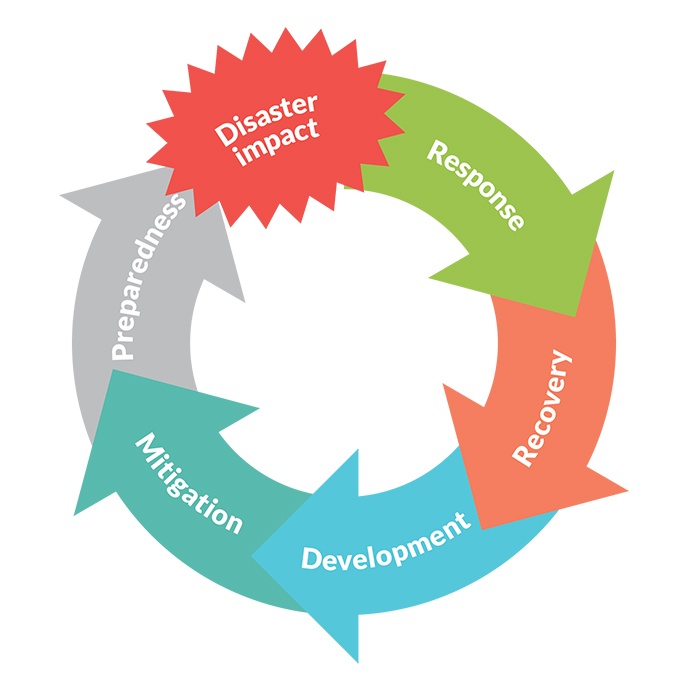Due to Pakistan’s location, disaster management is a highly difficult vocation to pursue. The probability of catastrophes is particularly high in Pakistan because the country’s terrain includes every form of climate and landmark. Geography, meteorology/climatology, earth sciences, and geophysics students ought to consider pursuing careers in disaster management in Pakistan.
Here you can get all information regarding the Disaster Management Career in Pakistan, such as type of disaster, courses, eligibility, employment sectors, skills, and Job opportunities.
Disaster management may be defined as the administration and coordination of all facets of disaster management, including readiness, response, and recovery. A disaster is a risky circumstance or occurrence that can happen at any time. The term catastrophe is derived from the French word “desastre”. Disaster can be seen as a bad star when the words “des” (bad) and “aster” (star) are combined. The regular growth process, as well as life, property, and the environment, are seriously threatened by natural disasters, man-made disasters, and hybrid disasters.
[lwptoc]
Natural forces like earthquakes, tsunamis, cyclones, and volcanic eruptions are what produce natural catastrophes. The second category is man-made disasters, including explosions, which are brought on by interactions between people and made-up settings. Epidemics are an example of a hybrid catastrophe, which combines both natural and man-made calamities. The causes of both natural and man-made disasters include growing populations, deforestation, and industrial development.
Disaster Management in Pakistan
Through disaster management, commonly referred to as emergency management, all forms of calamities may be controlled. Its major goal is to lessen the terrible consequences of catastrophes on impacted populations and assist them in quickly returning to their regular life.
A wide range of problems are covered by the multidisciplinary discipline of catastrophe management, including monitoring, assessments, rescue, relief, rebuilding, and rehabilitation. Planning and carrying out operations during, after, and after disasters fall under the purview of this profession. It involves a number of processes, including alerts, prompt responses, timely warnings, effective coordination, and efficient coordination. Even if they can’t be prevented, natural catastrophes’ effects can be endured.
The municipal and state governments in Pakistan are responsible for disaster management. The option of disaster administration has also been introduced by the legislature. Many foundations provide disaster management courses that can aid in crisis management. To progress society, a lot of non-governmental organisations and administrations need crisis management specialists. Despite the risks, fiasco management is one of those careers that provides mental fulfilment to those obliged to serve the public. It is a genuinely paid employment.
Disaster Management Career in Pakistan Scope and Jobs

Disaster Management Scope in Pakistan
It is a challenging yet rewarding career. Workers in disaster management assist in protecting victims and minimising damage when catastrophes occur. They are also in charge of organising and being ready to handle upcoming situations. This extremely specialised subject necessitates extensive training and credentials.
It is a fulfilling profession. It is a great profession since you may aid those in need while also obtaining a high-skilled position that pays well. You may advance and progress in the industry as well. You also have the choice of working and travelling overseas. A great career is in disaster management.
Types of Disasters
Disasters can take many different forms. A disaster’s length might range from hourly interruption to weeks or days of nonstop devastation. Here is a list of the various catastrophes, both natural and man-made, that may impact a society.
Natural Disasters
Large-scale meteorological or geological catastrophes that result in the loss of lives or property are considered natural disasters. Among these catastrophes are:
- Tornadoes, Severe Storms
- Hurricanes and tropical storms
- Floods
- Wildfires
- Earthquakes
- Drought
- Cyclones
- Tsunamis
- Fires
- Volcanic Eruptions
Man-made Disasters
Disasters can also be caused by people. Chemical spills and groundwater pollution are two instances of hazardous materials situations. Workplace fires are growing increasingly frequent and can cause serious property damage or even fatalities. Communities can also be threatened by extremist organisations who employ violence against people and property. Military and civilian government installations, major cities, famous monuments, and international airports are the targets with the highest danger. These are a few instances of man-made catastrophes:
- Terrorist Attacks
- Road and other accidents
- Fire at home or work
- Hazardous materials
- Power service disruption & blackout
- Nuclear power plant and nuclear blast
- Radiological emergencies
- Chemical weapons and biological weapons
- Cyber attacks
- Explosion
- Civil unrest
In order to aid emergency managers in anticipating and responding to catastrophes, the National Governors Association developed a phase model for disaster management. The “life cycle” of comprehensive emergency management is another name for this. The four stages of disaster management are as follows.
- Mitigation;
- Preparedness;
- Response;
- Recovery.
Disaster management refers to the clever application of competent techniques to handle calamities. The tactics or approaches employed depend on the economic standing of a nation. As a result, it may differ from one nation to another. The wealthy nations are more prepared to handle calamities than the developing nations are. Pakistan is second among developing nations in terms of catastrophe fatalities due to its geographic location, climate, and geological setting. The course will be useful to social workers.
Eligibility to Courses
Short-term certificates, diplomas, and postgraduate degrees are available in disaster management. Basic educational qualification, i.e., Higher Secondary Certificate Examination (10+2) required to pursue a career as a disaster manager. For master’s or MBA programs, students must be graduates in all fields (even engineering or medicine) and have at least 50 percent marks from any university or institute.
Disaster Management Career in Pakistan
Due to its diverse topography, Pakistan is vulnerable to natural calamities. Therefore, additional catastrophe management specialists are required. In this industry, there are many of career prospects. These include the disaster management divisions of governmental organisations like fire departments, drought management organisations, law enforcement agencies, humanitarian aid providers, insurance firms, and businesses in high-risk industries like the chemical, mining, or petroleum industries. Each cell features a cell for disaster management. You might work as a social worker, environmental specialist, rehabilitator, etc.
Buildings that are robust to calamities can be created by engineers that specialise in disaster management. It’s possible for students studying catastrophe management to launch their own consulting businesses. It’s crucial to control and safeguard the population against dangers of all kinds. Extreme caution should be used when doing this. The discipline of disaster management is mainly administrative in nature. As a result, one should be ready to enter the industry by being aware of all the benefits and drawbacks.
The Disaster Management team should be ready for any situation and be able to respond to the needs of individuals who are impacted swiftly and effectively. They need to have a plan and be ready for everything. Planning may lessen the effect and severity of catastrophes.
Workshops and training in disaster management will be provided to paramilitary members, firefighters, and public workers who are undergoing training.
Careers Sectors for Disaster Management
Government Sectors
- National Disaster Management Authority
- National Disaster Risk Management Fund
- Provincial Disaster Management Authorities (All Provinces)
- State Disaster Management Authority (AJK).
- Federal Flood Commission
- Planning and Development Board (s)
- Rescue 1122
Non-Government Sectors
- INGOs (Islamic Relief and Save the Children, Oxfam International, etc.
- NGOs (Pakistan Red Crescent Society, Al-Khidmat Foundation Pakistan, etc.)
- UN Agencies (UNDP, UNDRR, UNESCO, etc.)
- International Donor Agencies (ADB/World Bank, USAID, DFID, etc.
Job Opportunities
- Anti-terrorism Emergency Manager
- Business Continuity Planner
- Manager of Business Risk
- Campus Emergency Manager
- Crisis Communication Specialist
- Disaster Recovery Coordinator
- Disaster Risk Specialist
- Emergency Management Policy Advisor
- Emergency Public Health Manager
- Emergency Social Services Manager
- Manager for Emergency Telecommunications
- Environmental Emergencies Specialist
- Event Safety and Emergency Management
- Hospital Emergency Manager
- Humanitarian Assistance Professional
- Industrial Emergency Manager
- International Aid Director
- International Development
- Worker
- NGO Disaster Relief Coordinator
- Oil and Gas Emergency Manager
- Professor
- Project Manager
- Public Policy Analyst
- Public Relations Representative
- Public Safety Consultant
- Researcher
- Safety Analyst
- Director of Social Programs
- Trauma Centre Supervisor
- Training
- Safety Officer
- Consult
- Professor
- Teacher
- Authority Expert
- Writer
- Rescue 1122 Worker
- Civil Defence Worker
- Worker for the Regulating Authority
You can also find job opportunities at National Disaster Management Authority (NDMA)
Required Skills
Professionals in disaster management must be physically and mentally fit to manage all kinds of situations. This profession requires prompt action. Anyone who wants to become a disaster manager should be aware of the current situation and be able to implement appropriate plans for it. Not only are they responsible for the well-being of others, but they also have to take care of their health and safety.
They must be able to handle large responsibilities. This career requires a high level of communication skills. They must communicate clearly and effectively. To excel in this field, one must have the good organizational ability and a strong team spirit.
